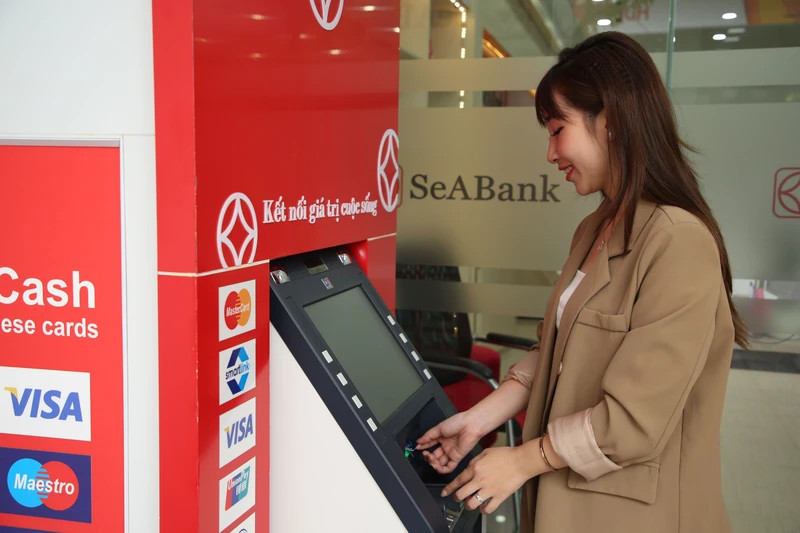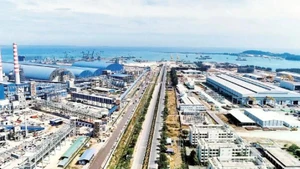Accordingly, 56% of Vietnamese respondents surveyed are now carrying less physical cash than they did a year ago, signaling a progressive mindset towards embracing new financial technologies. Particularly, young consumers are playing a pioneering role in the shift towards cashless payment, with 89% of the surveyed having successfully adopted cashless methods in daily life.
Towards a cashless economy
Research from Visa shows that the prevailing trends are shaping up the cashless economy in Vietnam, opening an important step that promises to bring significant transformation to the payment and financial landscape in the near future. Visa said Vietnam is among the top Southeast Asian markets with rapid adoption of mobile wallets as the preferred method for making payments, contributing to accelerating the growth of digital finance. With four in every five Vietnamese consumers utilising mobile wallets, the country is poised to emerge as one of the regional leaders in mobile finance.
Along with e-wallets, recently, real-time payments (RTPs) have gained significant momentum in Vietnam, an illustration for the nation’s embrace of cutting-edge financial technologies. The RTPs offer unparalleled convenience and efficiency, driving further digitisation of the economy. In Vietnam, RTPs are growing in popularity, with at least two in five consumers having used them. Application of RTPs has been diversified, comprising cross-border transactions, peer-to-peer transfers, merchant/retailer payments, and bill payments.
In addition, buy now pay later (BNPL) is a popular service availed by Vietnamese consumers, offering flexible payment options and driving consumer engagement. Visa's strategic partnerships with leading Vietnamese retailers for Visa Instalment Solutions demonstrate the transformative impact of such solutions in fostering financial inclusion and driving business growth. Credit cards, although less utilised for wallet top-ups and funding, are the preferred choice for BNPL plans in Vietnam. Easy to use apps, free vouchers, rewards points, and the ease of payment tracking were the key drivers for the uptake of BNPL offers.
Promoting digital transformation
It can be said that the wave of cashless economy in Vietnam is bringing countless potential for growth and innovation, unlocking opportunities for consumers and businesses alike in the continued shift to a cashless society.
Also according to Visa's report, towards a future of convenient and safe digital transactions for the community, Visa will continue to maintain its leading role in the innovative digital transformation journey, thus promoting the digital economy in Vietnam.
Dang Tuyet Dung, Visa Country Manager for Vietnam and Laos, said Visa remains committed to driving innovation and enhancing digital payment experiences for consumers.
The findings from the Visa study affirm the growing trend towards contactless transactions, exemplified by a significant 53% increase in contactless transactions made on Visa cards, a 19% surge in purchases made on Visa cards, along with a substantial rise in the total value of cross-border transactions, she added.
Statistics from the State Bank of Vietnam (SBV) revealed that non-cash payment and digital banking activities have shown positive results. As of the end of 2023, the number of individual payment accounts reached more than 182.88 million, up 21.8% year on year.
In January 2024, non-cash transaction surged 63.3% in volume and 41.45% in value compared to the same time last year. Meanwhile, transactions through internet rose 57.85% in volume and 32.43% in value, and those through QR codes shot up 892.95% in volume and over 1,062% in value.
In cross-border retail payments, the State Bank of Vietnam has also cooperated with a number of countries in the region (Thailand, Cambodia, Laos) to test bilateral retail payment connections via QR code.
Furthermore, the implementation of high technology applications in banking activities also achieved many impressive results. As of 2023, there were about 40 banks and foreign bank branches opening electronic payment accounts (eKYC), with more than 35 million active eKYC payment accounts.
With the trend of strongly applying digital technology to banking activities, the SBV has encouraged credit institutions to carry out digitalisation, promote cooperation with different sectors to form and expand the digital ecosystem, while completing legal framework, mechanisms and policies on cashless payment.
To continue perfecting the legal framework, mechanisms, and policies on cashless payments and digital transformation, the SBV will focus on completing and submitting the promulgation of a new decree on cashless payments and a decree on controlled testing mechanism of technology activities in the banking Sector. At the same time, the SBV will continue to promote cashless payments for public services, especially in the fields of health, education, and social security payments.
















